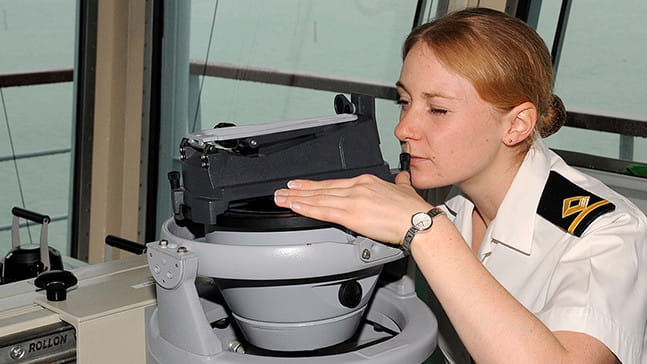Qualified Deck Officer (RFA)
From fuel to food, you’ll be central to the operations that provide essential supplies to the Royal Navy, all over the world.
- MCA Certified
- Royal Fleet Auxiliary
- Warfare
- Officer level
Pay
Leave
£86,000
Pension
World-class
Travel

I’m responsible for all aspects of ship handling and day to day operations. No day is ever the same and having to wear lots of different hats makes life on board varied and interesting.
Role details
What you’ll do
As a Qualified Deck Officer in the Royal Fleet Auxiliary (RFA), you’ll be central to the Replenishment at Sea operations that provide vital support to the Royal Navy, all over the world. Delivering fuel, food, ammunition and supplies to our warships is no easy task, and you’ll make sure it happens safely and efficiently. You’ll also take responsibility for assisting Royal Marines as part of amphibious operations, and be part of your ship’s management team. It’s a role that is as challenging as it is rewarding, and from day one you’ll be on your way to a career that’s the ultimate in civilian seamanship.
Your role
- The logistical support provided by the RFA couldn’t happen without your team’s advanced seamanship skills and specialist knowledge, especially when you’re on a Fast Fleet Tanker transferring fuel to a Type 45 destroyer.
- Perform key duties when the ship is in port, including acting as Officer of the Watch and Officer of the Day. You might be the first point of contact for a visiting VIP, or taking delivery of vital equipment and supplies.
- Use your first-class navigational skills to influence every operation, whether you’re trying to locate drug runners, or trawling the Indian Ocean for pirates.
- Be part of the management team of the deck department and work towards becoming the Executive Officer of the ship, which involves mentoring and supporting your juniors, or ultimately, become the Commanding Officer.
Pay & benefits
- £37,700+ salary from the day you start
- Earned Voyage Leave (EVL) of 21 days for every month spent on board ship
- Membership of a Civil Service Pension scheme
- World-class training
- Potential to travel the world
Skills for life
Qualifications you'll gain
- Further MCA qualifications fully supported by the RFA
- Military Navigation and Warfare Training
Skills you'll develop
- An in-depth knowledge of Navy specific Navigation and Warfare
- The ability to lead and manage a highly skilled team
Eligibility
- Aged at least 17 years 6 months to apply, and 18 years to commence employment. There is no upper age limit
- ENG1 medical certificate, unrestricted for worldwide sea service
- The Certificate of Competency you have will determine which level you enter the RFA. You must have one of the following: Officer of the Watch (unlimited) Certificate of Competency (COC); Chief Mate (unlimited); or Masters (unlimited)
- STCW code - Table A, IV/2 Global Maritime Distress and Safety System Radio Operators Certificate
- HND in Nautical Science or Foundation Degree in Marine Operations
- Advanced Oil Tanker Training Endorsement (At Chief Mate level)
- Recent sea time of at least 6 months in the last 3 years
- Four elements of basic training, updated iaw Manila Convention 2010
- Personal Survival Techniques (STCW Code-Table A-Vl/1-1)
- Fire Prevention and Fire Fighting (STCW Code-Table A-Vl/1-2)
- Elementary First Aid (STCW Code-Table A-Vl/1-3)
- Personal Safety and Social Responsibilities (STCW Code-Table A-Vl/1-4)
-
Must be British, Irish or Commonwealth citizens. However, a number of career paths have nationality restrictions. Dual Nationality will be considered providing the first nationality is British. Note: Residency restrictions may apply
-
Need to have confidence with jumping into water and the ability to wade whilst wearing a life jacket
Skills & Interests
- An ability to thrive on responsibility and lead from the front
- Confidence making key decisions in high-pressure situations
- A problem solver, with a common sense approach, who can work well as part of a team
Joining Process
From picking your role to starting on your first day, these are the steps you'll take to join as a rating.
Eligibility
Defence Aptitude Assessment (DAA)
Interview
On successful completion of the test you will be invited to Portsmouth for a Suitability Interview that will confirm that you’re ready for the Admiralty Board (AIB)
Admiralty Interview Board (AIB)
Training
Career Progression
Got a question?
Our virtual recruiter is available to answer your questions 24 hours a day
